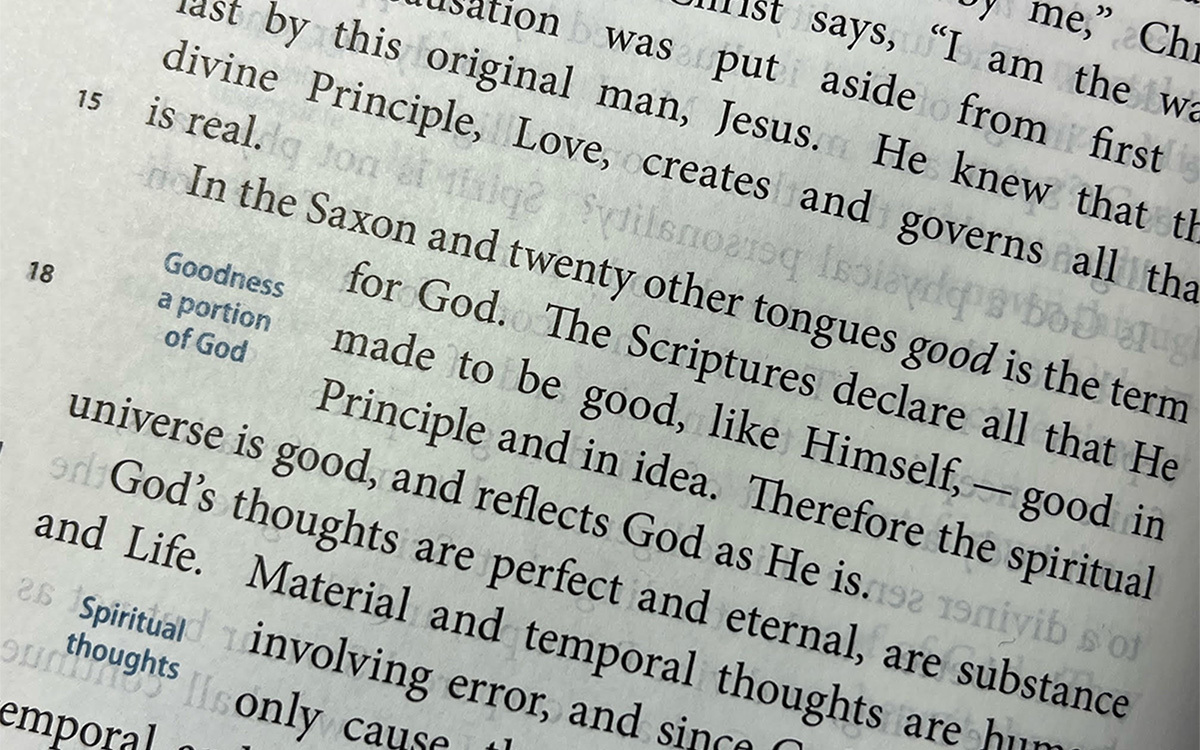“Good is the term for God”

We are sometimes asked to provide background information on this statement in Science and Health with Key to the Scriptures by Mary Baker Eddy: “In the Saxon and twenty other tongues good is the term for God.”1
The source for this statement is not known, and The Mary Baker Eddy Library’s collections do not indicate what those “twenty other tongues” refer to.
While a relationship between God and good has long been debated from an etymological point of view, this relationship is nevertheless central to Eddy’s teaching of Christian Science. In the current edition of Science and Health, Eddy refers to the book’s Glossary as containing “the metaphysical interpretation of Bible terms, giving their spiritual sense, which is also their original meaning.”2 And the Glossary includes this definition: “GOOD. God; Spirit; omnipotence; omniscience; omnipresence; omni-action.”3
It is noteworthy that in Eddy’s day, much as today, the question was openly discussed as to whether the words God and good were related. By 1887, Webster’s American Dictionary of the English Language indicated that the word god (God) derives from the Anglo-Saxon word god and that the word good also derives from the word gõd. While similar in appearance, however, god and gõd do not derive from the same source.4 In 1889 Webster’s Dictionary acknowledged that a connection between God and good had often been inferred, but that there was no linguistic proof of the relationship, given the differences in other languages.5
Perhaps the similarity of the two words may have led the English grammarian Dr. Samuel Johnson to state in the 1755 Dictionary of the English Language that God derives from “god, Saxon which likewise signifies good.” Johnson asserted that “the same word passes in both senses with only accidental variations through all the Teutonick dialects.”6
The Century Dictionary states that “popular etymology has long derived God from good; but a comparison of the forms (see good) shows this to be an error.” The 1911 edition states, “modern philologists do not regard good as a ‘term for God.’”7
Eddy first etymologically linked God to good in a sermon delivered in March 1880. This was later printed as “Life” in the February 2, 1918, issue of the Christian Science Sentinel: “In the original texts, the term God took its origin from the word good….”8
In May 1880 Eddy published another sermon, Christian Healing, which made a similar statement: “In the original text the term ‘God’ was derived from the word ‘good.’”9 It is unclear what “original text” Eddy was referring to. In 1881 she repeated these ideas in the 3rd edition of Science and Health:
In the original text good was the term for God…. The signification of God in the original text being “good,” the term Christ Jesus may be rendered as good man, or God man.10
In the June 1883 issue of the Journal of Christian Science, Eddy specifically connected God, good, and the Hebrew language. In a sermon titled “People’s Idea of God,” she said this: “I like the Hebrew term that gives another letter to the word God and makes it good….”11
In a December 1883 Journal article, later printed in her book Miscellaneous Writings 1883–1896, she again connected God, good, and the Hebrew language: “The Hebrew for Deity was ‘good,’ and vice versa….”12
In 1884 Eddy began identifying a connection between God, good, and the Saxon language. She made this reference in a draft of a November 1884 sermon: “…Divine Good, the Saxon for God, Divine Truth and Love.”13
In the 16th edition of Science and Health, published in 1886, Eddy changed the statement that had appeared since the 3rd edition, adjusting the words original text to Saxon language: “In the Saxon language good was the term for God.”14 Then in 1907 Eddy revised that sentence to include the phrase “and twenty other tongues”: “In the Saxon and twenty other tongues good is the term for God.”15
- Mary Baker Eddy, Science and Health with Key to the Scriptures (Boston: The Christian Science Board of Directors), 286.
- Eddy, Science and Health, 579.
- Eddy, Science and Health, 587.
- An American Dictionary of the English Language (Springfield, MA: G. & C. Merriam & Co., 1887), 577–578.
- See An American Dictionary of the English Language, (Springfield, MA: G. & C. Merriam & Co., 1889), 577.
- Samuel Johnson, A Dictionary of the English Language, Vol. 1 (London: W. Strahan, 1773).
- The Century Dictionary and Cyclopedia, 1911, Vol. 4, p. 2561.
- Mary Baker Eddy, “Subject – Life,” 28 March 1880, A10356.
- Eddy, Christian Healing: A Sermon Delivered at Boston (Boston: The Christian Science Board of Directors), 3.
- Mary Baker G. Eddy, Science and Health, 3rd ed. (Boston: Dr. Asa G. Eddy, 1881), vol. 1, 14, 40.
- Eddy, “The People’s God,” The Christian Science Journal, June 1883, 1. The wording is slightly different in Eddy’s book Prose Works other than Science and Health (Boston: The Christian Science Board of Directors, 1925).
- Mary Baker Eddy, “Bible Lessons,” The Christian Science Journal, December 1883, 5.
- Eddy, sermon, 16 November 1884, A10088.
- Eddy, Science and Health with Key to the Scriptures, 16th ed. (Boston: Mary Baker G. Eddy, 1886),18.
- Eddy, Science and Health with Key to the Scriptures (Boston: Joseph Armstrong, 1907), 286.

